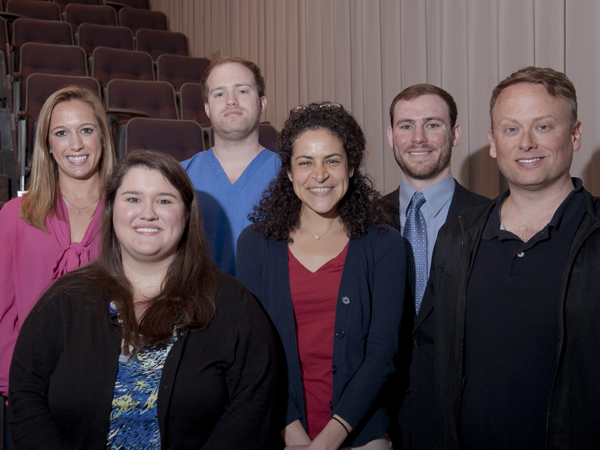Interprofessional learning focus of ASB sessions

The future of patient care says that no health professional is an island.
It insists that health-care givers work and talk more among themselves: dentist and doctor, pharmacist and nurse, researcher and allied-health professional.
In the spirit of this vision, the Associated Student Body has taken up the gauntlet by launching ASB Interprofessional Sessions, which engages the six professional schools represented at the Medical Center.
On March 26, around 150 students met for the first time to become more familiar with the trials and triumphs of their counterparts in the schools of dentistry, graduate studies, health related professions, medicine, nursing and pharmacy.
"Our students learn from the same body of knowledge, but from different perspectives," said Dr. Rob Rockhold, professor of pharmacology and toxicology in the School of Medicine, professor of health sciences in the School of Health Related Professions and deputy chief academic officer.
"This is an opportunity for them to understand those different perspectives."
It is one attempt to improve patient care by filling in knowledge gaps that divide the various professions, he said.
When two or more health professionals work together, patients thrive, while costs and mistakes drop, stated a March 2011 article published by the American Dental Education Association's explorehealthcareers.org; "Interprofessional Healthcare Education Means Better Patient Care."
The push for collaboration is also an acknowledgement that, like the people who treat them, illnesses don't exist in a vacuum - that gum disease, for instance, may be linked to heart disease. "(M)any health conditions come from a variety of causes, affect several body systems, or both," the article stated.
At UMMC, Peter Mittwede took this concept to heart by organizing the ASB sessions, with plans to hold them monthly. The next gathering is scheduled for noon Wednesday, April 22 in classroom R153 (lower amphitheater), with featured speaker Dr. Shirley Schlessinger, professor of medicine and associate dean for Graduate Medical Education.
"Interprofessional education is going to be a big accreditation issue in coming years,' said Mittwede, ASB president and an M.D./Ph.D. candidate.
It may, in fact, drive changes in curriculum, Rockhold said.
For the inaugural session, called Trainee Talks, Mittwede and medical student Wilfreda Lindsey, the ASB Interprofessional Chair, invited the six student speakers to tackle the issue of leadership.
Representing his or her school were Matt Loeb, dentistry; Ellen Gillis, graduate studies; Eric Holland, health-related professions; Sarah Ali, medicine; Connor Fairchild, nursing; and Christine Hayden, pharmacy.
"Effective leadership means having the confidence to let others be the expert," said Holland, a physical therapy student whose school also offers degrees in occupational therapy; medical laboratory science; cytotechnology; dental hygiene; health sciences; health informatics and information management; radiologic sciences; nuclear medicine; and heath administration.
"It's being open to learning from everyone around you."
It means communicating to others what's expected of them, Ali said, and having a vision that "expresses the overall goal" in a patient's care.
For Fairchild, it means "working hard to change the environment," when needed, along with delegating responsibility, ensuring that all resources are available and learning through community service.
It means accountability, Hayden said. "Never forget the decisions we make (concerning) the patient are a matter of life and death. In the School of Pharmacy, we are accountable to every one of you."
In a world where National Institutes of Health funding has reached relatively abysmal levels for young scientists, said Gillis, it means digging up other funding sources, and gaining leadership experience through professional societies, advocacy committees and more. It means mentoring others in the lab.
For dentists working in a state where access to oral care is scarce in rural areas, it means creating programs that confront the challenge, Loeb said. It means taking on the problem by participating in the Mississippi Rural Dentists Scholarship Program, Give Kids a Smile Day, the Jackson Free Clinic Dental Clinic, the Mission of Mercy free dental care program and more.
This first-time event was especially well-attended, Rockhold said.
"It's one of the few formal environments we have, led by the ASB, where students can hear what their fellow students in other schools are doing. This is a really good start."


